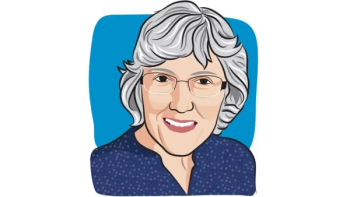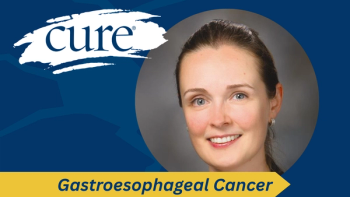
Workshop Aims to Ease the Journey for Family Caregivers of Women With Ovarian Cancer
Mark Gibbons, senior director of external programs with the nonprofit Caregiver Action Network, explains the importance of caregivers taking care of themselves while at the Ovarian Cancer National Conference.
There are two reassuring ideas that family caregivers tend to overlook when they’re aiding a loved one who has ovarian cancer: They’re not alone, and they have the right to set limits on how much they can do.
Mark Gibbons, senior director of external programs with the nonprofit Caregiver Action Network, drove those points home in a “Caring for the Caregiver” workshop during the 2017 Ovarian Cancer National Conference. Sponsored by the Ovarian Cancer Research Fund Alliance, the conference took place July 7-9, in Chicago.
Before leading the workshop, Gibbons sat down with CURE® to discuss those concepts and other strategies he believes can help caregivers navigate a variety of challenges. Caregiver Action Network supports ovarian cancer research, teaches about the disease and aids those affected by it.
What are some of the main ideas you plan to share in your workshop?
We start off by asking attendees how they felt when their loved one first got diagnosed. It’s usually the same types of answers: overwhelmed, depressed, sad. Maybe they’ll recall asking “Why my mother?” or “Why my sister?” or “Why my wife?” and those are all OK questions. Or they might even ask “When am I going to get my life back?” which might seem selfish but is a valid question. We go through this exercise to let them know that everybody’s in the same boat. They’re not alone, and it’s OK to have these negative feelings.
Then, we remind them of the importance of respite, of taking care of yourself. Even if it’s just for five or 10 minutes a day, just do something for yourself — step outside and get a breath of fresh air — to regroup and refocus. Make sure that you eat right and sleep and make it to your own doctor’s appointments, because you’re always so busy taking care of your loved one that you might forget that you should be taking care of yourself.
We also teach our attendees how to ask for help. People will come up to them and say, ‘I understand your loved one has this illness; how can I help?’ and they might just sit there with that deer-in-the-headlights look and, say, ‘I haven’t really thought about that.’ Maybe it can be something as simple as ‘Can you send your son over to mow the front lawn?’ or ‘I just need to go out and get groceries — can you step in and take care of my loved one while I’m gone?’ When people want to help and you don’t know what to do or how to ask, you’re missing an opportunity.
Also important is organization, such as creating a medication list. Keep a list that includes everything your loved one is taking for all the conditions she has, plus any herbals, supplements or over-the-counter drugs and the last time they received a vaccination; when you go to the doctor’s office, you are your loved one’s advocate, and you want to prevent the prescription of any medicines that counteract each other. Also create a file of health insurance information and other medical forms, such as “do not resuscitate” orders. It’s all still a way of taking care of yourself, because the more organized you are and the more information you provide, the less stress you’ll experience.
Finally, we mention that there are resources out there for caregivers, including some that we offer. Besides our main website, we have one that just offers help for cancer caregivers (http://caregiveraction.org/community), where they can go and talk to other people who are experiencing this journey. All of this is about communicating and getting as much off your chest as you possibly can, because if you keep it bottled up you’re hurting yourself. It’s all about networking, talking and communicating.
Here at the conference, you’ll offer support aimed specifically at male caregivers. Why is this needed?
Men can have a hard time communicating, and this situation is a little bit harder, because usually the women are the ones who run everything: They run the household and organize the bills. This is like a role reversal for a lot of men, who are thrown in and say, ‘My gosh, it’s harder than I thought — she was doing all this and I didn’t even realize it.’ For them to take on this role and admit that they need help is tough, so that’s why we’re going to have a men’s-only session, the first time we’ve done that here. We’re not going to have a script and we’re not going to have a presentation. We’re just going to let them talk and vent and give them a chance to break down if they need to, because they’re always supposed to be the strong ones, but when you see your loved one with an illness you feel helpless.
What are some of the financial issues that face caregivers of patients with ovarian cancer?
Depending on insurance, there’s still always an out-of-pocket expense. Most people in the country pay $8,000 to $15,000 out of pocket for any illness, and some are more expensive than others. And there are a lot of things insurance doesn’t cover, things like transportation costs. What do I have to pay at the hospital to park? What if I live in rural Indiana and the closest hospital where my wife can get treatment is three hours away? Or right after chemo, you may not want to eat with metal utensils, but instead with plastic, because of the taste. So there are a lot of things involved in cost that people don’t realize. And, of course, the costs are not just financial: They’re physical and mental, too.
What’s the most important message you want to impart during the workshop?
I will have attendees repeat after me: “It’s OK to say no.” You cannot do it all. You want to, and in your mind you’re the only one who can provide that high level of care, but you can’t do it all. So I always have them repeat that phrase, and it’s like a burden has been lifted.



